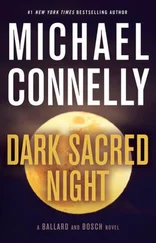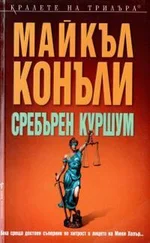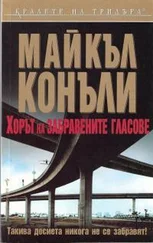We were in San Pedro now. Once a small fishing village, it was now part of the giant Port of Los Angeles complex, serving as a bedroom community for many of those who worked on the docks and in the shipping and oil industries. It had once had a full courthouse where I appeared regularly on behalf of clients accused of crimes. But the justice complex was shuttered by the county in a cost-cutting move and the cases moved up to a courthouse by the airport. The San Pedro courthouse had now stood abandoned for well over a decade.
“I used to come down to Pedro a lot on cases,” I said.
“I used to come down when I was a teenager,” Bosch said. “Sneak out of whatever place they put me, come down to the docks. I got tattooed down here once.”
I just nodded. It looked like he was reliving the memory and I didn’t want to intrude. I knew very little about Bosch’s early life beyond what I had read once in an unauthorized profile in the Times. I remembered foster homes and an early enlistment in the army, with Vietnam as the destination. This was decades before we learned of our blood connection.
We crossed the Vincent Thomas, the tall green suicide bridge that connected to Terminal Island. The entire island was dedicated to port and industrial operations, with the exception of the federal prison at the far end. Bosch exited the freeway and used surface streets to get us moving along the northern edge of the island and next to one of the deep port channels.
“Taking a wild guess,” I said. “Opparizio has some kind of smuggling operation here. Stuff coming in on cargo containers. Drugs? Humans? What?”
“Not that I know of,” Bosch said. “I’m going to show you something else. You see this area?”
He pointed through the windshield toward a vast parking lot filled with plastic-wrapped cars fresh off the boats from Japan.
“There used to be a Ford Motor plant here,” Bosch said. “It was called Long Beach Assembly and they made the Model A. My mother’s father supposedly worked there in the thirties on the Model A line.”
“What was he like?” I asked.
“I never met him. Only heard the story.”
“And now it’s Toyotas.”
I gestured toward the vast parking lot of new cars ready to be disseminated to dealers across the West.
Bosch turned onto a crushed-shell road that ran alongside a rock jetty lining the channel. A black-and-white oil tanker the length of a football field, including the end zones, was slowly making its way down the channel to the port. Bosch pulled to a stop by what looked like an abandoned railroad spur and killed the engine.
“Let’s walk up to the jetty,” he said. “I’ll show you what we’ve got as soon as this tanker goes by.”
We followed an uphill walk to the top of a berm that ran behind the jetty as a barrier against high tides. By standing on top of it we got a solid view across the channel of the various petroleum refining and storage facilities vital to the operations of the port.
“Okay, so this is the Cerritos Channel right here and we are looking north,” Bosch said. “That’s Wilmington directly across the water and Long Beach to the right.”
“Okay,” I said. “What exactly are we looking at?”
“The center of the California oil business. You’ve got the Marathon, Valero, Tesoro refineries right there. Chevron is farther up. The oil comes in here from all over — even Alaska. Comes to port by supertanker, barge, rail, pipeline, you name it. Then it goes over there to the refineries and it gets processed and from there into distribution. Into tanker trucks and out to your local gas station and then into your own gas tank.”
“What’s it all got to do with the case?”
“Maybe nothing. Maybe everything. You see that refinery at the end there with the catwalks around the tanks?”
He pointed to the right and at a small refinery with a single stack billowing a white plume of smoke into the sky. An American flag was draped around the upper section of the stack. There were two side-by-side storage tanks that looked to be at least four stories tall and were surrounded by multiple catwalks.
“I see it,” I said.
“That’s BioGreen Industries,” Bosch said. “You won’t find Louis Opparizio’s name attached to any of the ownership documents but he holds the controlling interest in BioGreen. No doubt about it.”
Bosch had my undivided attention now.
“How did you find that out?” I asked.
“I followed the honey,” Bosch said.
“What’s that mean?”
“Well, nine years ago you were able to drag Opparizio through the legal wood chipper at the trial for your client Lisa Trammel. I pulled the transcript and read his testimony. He—”
“You don’t have to tell me. I was there, remember?”
Another tanker was coming down the channel. It was so wide, it had little margin for error as it navigated between the jagged rocks that lined both sides.
“I know you were there,” Bosch said. “But what you might not know is that Louis Opparizio learned a lot from getting pounded by you that day on the stand. Number one, he learned never again to be connected by legal documentation to any of his companies — legit or not. He currently owns nothing in his name and is connected to no company, board, or reported investment to anything. He uses people as fronts.”
“I’m damn proud I was able to teach him how to be a better criminal. How did you get around it?”
“The Internet is still a pretty useful tool. Social media, newspaper archives. Opparizio’s father died four years ago. There was a service in New Jersey and a virtual visitation book. Friends and family signed in, and damn if the funeral home’s website doesn’t still have it online.”
“More like hot damn. You got lots of names.”
“Names and connections. I started tracing, looking for stuff out here. Three Opparizio associates are vested owners of BioGreen and make up a majority interest. He controls it through them. One of them is named Jeannie Ferrigno, who in the last seven years has risen from a Vegas stripper with a couple of possession pops on her record to part owner of a variety of businesses from there to here and back again. I think Jeannie is Opparizio’s sidepiece.”
“Follow the honey.”
“Right to BioGreen.”
“This is getting good, Bosch.”
I pointed down the channel to the refinery.
“But if Opparizio has a secret ownership in businesses from here to Vegas, why are we looking at this one?”
“Because this is where the biggest money is. You see that place? It’s not a typical refinery. It’s a biodiesel plant. Basically, it makes fuel from plants and animal fat. It’s recycling waste into an alternate fuel that costs less and burns cleaner. And right now it’s the apple of the government’s eye because it reduces our national dependence on oil. It’s the future, and Louis Opparizio is riding the wave. The government is propping this business up, paying companies like BioGreen a premium on each barrel just to make it. That’s on top of what they get for then going out and selling that barrel.”
“And where there’s government subsidy, there is always corruption.”
“You got that right.”
I started pacing along the worn footpath on top of the berm. I was trying to see the connections and how this could all work.
“So, there’s a guy,” Bosch said. “A lieutenant who runs the bureau at Harbor Division. I trained him twenty-five years ago when he came through Hollywood detectives as a D-one.”
“Can you talk to him?” I asked.
“Already did. He knows I’m retired, so I told him I was fishing around for a friend who is interested in BioGreen as an investment. I wanted to know if there were any red flags and he told me, yeah, there’s a big red flag, an FBI flag on the place.”
Читать дальше
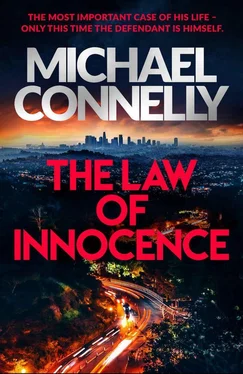

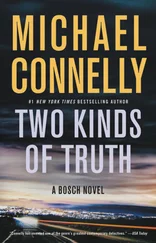

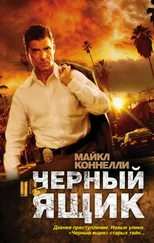
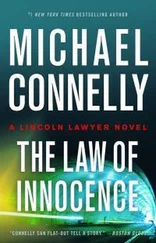
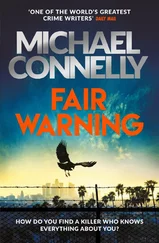
![Майкл Коннелли - The Night Fire [Harry Bosch - 22]](/books/405630/majkl-konnelli-the-night-fire-harry-bosch-22-thumb.webp)
